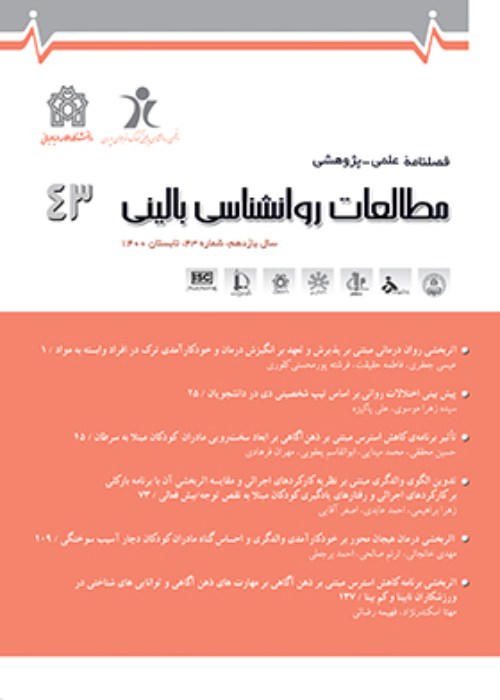Identity development in the cultural context: Master narratives of Iran
Author(s):
Article Type:
Research/Original Article (دارای رتبه معتبر)
Abstract:
Master Narratives are shared, sociocultural stories that contain common concepts within a specific culture and could be elicited from the personal narratives. These massive societal structures are originally the context of personal narratives as they offer appropriate material for personal narratives. The cultural narratives are not frozen and fixed in time; they modify and transform through history. Cultural meanings have been altered down the generations and the dominant narratives have inspired individuals in making their life narrative accounts. This study aims to reach the repetitive themes and the common contents of individuals’ personal narratives by analyzing them with quantitative and qualitative methods. To do so we conducted an open interview to collect the life narratives of 30 adults around the potentially conflictual identity issue of religious and sexual development. Participants also answered the HEXACO personality inventory and the Circumplex Religious Orientation Inventory (CROI). In the quantitative part, we analyzed the narratives conducting McAdams’ (1999) reliable coding schemes. In the qualitative part, the master narrative model proposed by Syed and McLean (2015) was used for the analysis. Results illustrated common repetitive themes in life narrative accounts which are considered as common societal stories. Within the massive sociocultural context, the Religious Traditional Master Narrative is in contrast with the Modern Alternative Narrative and this enormous conflict has been reflected in individuals’ identity structure. Individuals internalize this conflict while internalizing the religious traditional master narrative and negotiating with the modern alternative one. In addition, Tradition has been identified as an autonomous factor which functions independently from the religion within the cultural context of Iran.
Keywords:
Language:
Persian
Published:
Quarterly of Clinical Psychology Studies, Volume:9 Issue: 34, 2019
Pages:
1 to 33
magiran.com/p2013657
دانلود و مطالعه متن این مقاله با یکی از روشهای زیر امکان پذیر است:
اشتراک شخصی
با عضویت و پرداخت آنلاین حق اشتراک یکساله به مبلغ 1,390,000ريال میتوانید 70 عنوان مطلب دانلود کنید!
اشتراک سازمانی
به کتابخانه دانشگاه یا محل کار خود پیشنهاد کنید تا اشتراک سازمانی این پایگاه را برای دسترسی نامحدود همه کاربران به متن مطالب تهیه نمایند!
توجه!
- حق عضویت دریافتی صرف حمایت از نشریات عضو و نگهداری، تکمیل و توسعه مگیران میشود.
- پرداخت حق اشتراک و دانلود مقالات اجازه بازنشر آن در سایر رسانههای چاپی و دیجیتال را به کاربر نمیدهد.
دسترسی سراسری کاربران دانشگاه پیام نور!
اعضای هیئت علمی و دانشجویان دانشگاه پیام نور در سراسر کشور، در صورت ثبت نام با ایمیل دانشگاهی، تا پایان فروردین ماه 1403 به مقالات سایت دسترسی خواهند داشت!
In order to view content subscription is required
Personal subscription
Subscribe magiran.com for 70 € euros via PayPal and download 70 articles during a year.
Organization subscription
Please contact us to subscribe your university or library for unlimited access!


